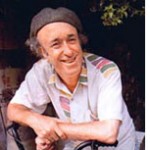By Dan Bloom

CHIAYI CITY, Taiwan — Back in April, I wrote a column for this online newspaper that previewed a new cli-fi movie from an independent producer in Hollywood that had backers like Sir Richard Branson and the World Bank behind it: Chloe and Theo. The co-star was Theo Ikummaqs, an Inuit man from Canada who plays himself. and I gushed enthusiastic about the two-hour feature film.
Well, the movie opened last week and the reviews have been terrible — no, worse than terrible. From the Daniel Gold’s negative review at the New York Times to Nathanael Hood’s straight-talking thumbs down at The Young Folk website, the verdict was a consensus by the nation’s film critics: great idea, poor execution.
In other words, the movie concept had promise, lots of promise, but the way the film was put together by producer, director. screenwriter and cast left most reviewers wondering what went wrong.
I myself haven’t seen the movie yet, but hope to catch it later when it screens in Taiwan. But first, some background.
Take an engaging and photogenic Inuit man from Canada and put him a United Nations ”comedy” — ”cli-fi-com” — that aims to serve as a warning flare about the possible impacts of global warming in the far north. Add some top co-stars, a Richard Branson producing credit on the poster, and it sound fantastic.
What could go wrong? Everything went wrong.
Dakota Johnson [who made the movie long before she shot her X-rated scenes in “Fifty Shades of Grey”] co-stars as a young woman who wants to help the Inuit climate activist seemingly adrift on the sea ice of Manhattan street life, and I am sure the producers felt her presence would attract younger fans. The movie poster shows her face and only her face, as if main star Theo Ikummaqs is invisible.
At a screening in April at a World Bank function in Washington, Marty Katz, the Canadian founder and president of Prospero Pictures, participated in a panel discussion about the power of cinema to connect with people over serious issues.
”Can film be an agent for social change? Can the arts be an agent for social change? Can anything but the arts be an agent for social change?” the Jewish film maven asked. “I can’t think of how to change people’s perception or behavior except for the arts.”
“I think that cinema can be a catalyst for those who can be social agents who can affect change in the world and I think that’s a great thing,” he added.
While climate change can be a scary and overwhelmingly difficult topic that people want to avoid, the storytelling in movies like ”Chloe and Theo” might be able to bring the harsh realities of climate change home to world audiences — and world leaders. But in this case, the movie was a big fat Hollywood fail.
All is not lost however, and I have a suggestion to make to the producers. Many film critics said the film reminded them of a 1970s government Public Service and others said while it fails as a serious movie for adults, it might work better as an after-school TV special aimed at teenagers worldwide.
I think that’s a sterling idea. Retool and re-market “Chloe and Theo” for the young adult teen market (even junior high school and primary school students) and air it later on worldwide as a TV movie of the week special on HBO or the MTV network.
The movie is not bad bad. It’s just not a very watchable movie for adults. But teenagers have different hormones and different expectations of cinema, and as an after-school TV special, “Chloe and Theo” might find the audience is was always after.
With the umpteenth United Nations climate conference in Paris coming up in late November — dubbed COP21 — this movie just might be what teens around the world need to see on TV or DVD.
*
Bloom, based in Taiwan, is a freelance writer who specializes in stories about climate change. You may contact him via dan.bloom@sdjewishworld.com